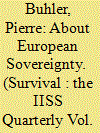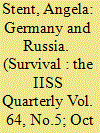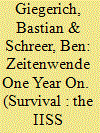| Srl | Item |
| 1 |
ID:
192142


|
|
|
|
|
| Summary/Abstract |
The coining of the concept of ‘European sovereignty’ by French President Emmanuel Macron in 2017 has prompted a heated debate, reviving disputes over supranationality, the nation-state and democracy that have resonated since the inception of the European project. Macron’s intervention came at a time when a flurry of crises compelled the European Union to move from its ambition of being a ‘normative power’ to living through its ‘Machiavellian moment’, against the backdrop of the rise of new global powers and existential threats for the security of the Union and its member states. But the term ‘European sovereignty’ is a misnomer. The real issue is one of power, not of sovereignty. Power proceeds from command, hardly an attribute of the complex shared decision-making process of the EU, leaving the objective of becoming a fully-fledged power out of reach for the European polity.
|
|
|
|
|
|
|
|
|
|
|
|
|
|
|
|
| 2 |
ID:
187255


|
|
|
|
|
| Summary/Abstract |
Following Russia’s invasion of Ukraine, German Chancellor Olaf Scholz appeared to jettison 50 years of Ostpolitik by pledging financial and military support for Ukraine, sanctioning Russia and promising to spend more on defence. Seven months into the war, progress on the German Zeitenwende (turning point) is mixed. Germany has sustained far-reaching sanctions and is grappling with weaning itself off Russian energy, but military deliveries to Ukraine have been slow. The German public continues to support Ukraine, but as winter approaches that support could erode, since Russia has tied future gas deliveries to the lifting of sanctions.
|
|
|
|
|
|
|
|
|
|
|
|
|
|
|
|
| 3 |
ID:
192140


|
|
|
|
|
| Summary/Abstract |
In response to Russia’s invasion of Ukraine on 24 February 2022, German Chancellor Olaf Scholz announced a Zeitenwende, or historical turning point, for German foreign and defence policy. Expectations of profound German geopolitical, geostrategic and geo-economic transformation were raised both in Germany and among Berlin’s allies. One year later, Germany’s greatest success has come in the geo-economic arena, where progress has been made to reduce Germany’s energy imports from Russia. Geopolitically, the picture is less convincing. While Scholz has committed to the defence of NATO territory against potential Russian aggression, it is not obvious whether the German government really perceives Russia as a direct threat to the country. Berlin has yet to formulate a convincing geopolitical leadership role in Europe, and it remains to be seen if the new defence minister, Boris Pistorius, will succeed in giving shape to much-needed Bundeswehr reform and resolve major readiness and procurement challenges. Consistent pressure from NATO allies will be needed to help bring about major change to Germany’s strategic and defence policy.
|
|
|
|
|
|
|
|
|
|
|
|
|
|
|
|